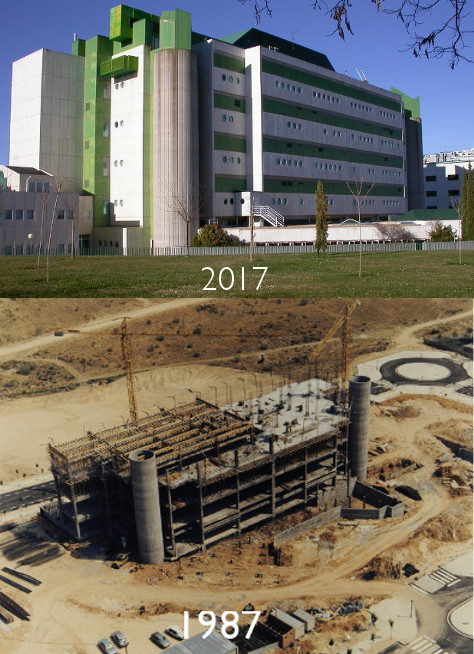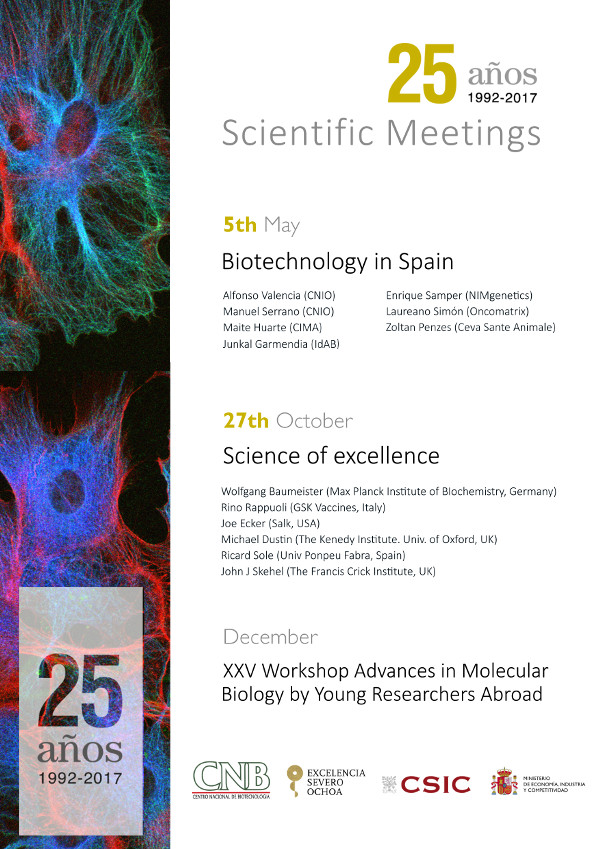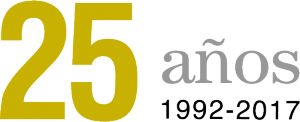
To celebrate, throughout 2017 the CNB-CSIC will host conferences for schools, university students and companies, as well as national and international congresses for the scientific community and meetings with young researchers. Representatives of industry, politicians and journalists will be invited to get to know the centre first hand.
"For 25 years, we have remained at the forefront of biology and biotechnology research. We want to celebrate this with all the staff that made it possible," says Fernando Rojo, current director of the CNB-CSIC.
Since its founding on 9 July 1992, the CNB has grown from a few dozen staff members to more than 650 professionals working to improve health, agriculture and the environment. Seven different directors have taken part in shaping the history of the centre, which today is organized into six departments with 70 research groups.
"To celebrate our first quarter century, we have prepared an extensive programme of attractive activities, some aimed at the scientific community and others at various sectors of society to whom we want to present our work," says Rojo.
 The programme, which received financial support from the FECYT, will include an exhibit commemorating 25 years of biotechnology at the centre and in Spain, an Open Doors Day, the presentation of short videos to show society the many research studies carried out at the centre, guided visits for high school students, and the development of a web site to connect scientists and citizens.
The programme, which received financial support from the FECYT, will include an exhibit commemorating 25 years of biotechnology at the centre and in Spain, an Open Doors Day, the presentation of short videos to show society the many research studies carried out at the centre, guided visits for high school students, and the development of a web site to connect scientists and citizens.
In addition, symposia to be held throughout the year will feature some of the most prominent international scientists who work in the centre’s research areas. A conference on 5 May will focus on former members of the CNB-CSIC who, after working in the centre, have developed successful scientific or business careers elsewhere. This event will serve as a meeting point for some of the leading representatives of Spanish biotechnology.
On 27 October, a second congress will be held to commemorate the anniversary. On this occasion, the speakers highlighted will be some of the world's foremost researchers in biomedicine, molecular plant genetics, systems biology and structural biology.
Meetings will also be held with representatives of the biotechnology industry who seek to showcase CNB science in the business sector and to bolster relations between these two areas.
With all these events, the CNB intends to involve society in the research carried out in its facilities over the last quarter century.
Research at the CNB-CSIC
Biotechnology to improve our health
Understanding the molecular processes that give rise to inflammatory diseases and cancer is essential to finding solutions for these diseases. With its inauguration in 1992, the CNB-CSIC became a pioneering centre in the combined study of immunology and oncology. In addition, the close relationship it maintained with the pharmaceutical industry during its first decade made the CNB a paradigm in Spain of collaboration between the public and private sectors in biomedical research.
Since the outset, infectious diseases have been a fundamental element in research lines at the CNB. Work by the centre's scientists contributes to the search for new antibiotics against bacterial infections and to the development of new vaccines for diseases such as influenza, hepatitis C, HIV and SARS. Vaccine prototypes shown to be effective and safe in clinical trials have already been developed for some of these.
The CNB-CSIC also hosts research on degenerative diseases, embryonic development and animal diseases. In addition, CNB laboratories have developed and characterized animal models that help scientists from around the world to study biological processes such as aging and diseases such as cancer.
Biotechnology to improve our agriculture and nutrition
In a world with a growing population, the demand for food is increasing. That is why the CNB explores ways to promote sustainable agriculture. We study plant development and defense mechanisms in stress situations, working with plants such as potato or tomato to obtain varieties more resistant to drought, extreme temperatures and pest attack.
The CNB-CSIC has also led the way by developing a system to detect gluten in foods. The method developed by the centre’s scientists is the most widely used in the world to ensure that foods suitable for celiacs are 100% gluten-free.
Biotechnology to improve our environment
Solving the problems of environmental pollution is another strategic line of action at the centre, where laboratories develop bacteria and plants able to remove toxic compounds from soil and water.
Genetic engineering techniques have allowed our scientists to obtain bacteria that can metabolize arsenic from contaminated soil and purify waters affected by oil spills or liquid manure from farms.
Technological development
From the outset, the CNB-CSIC has also striven to generate new technologies that allow other research centres to broaden their knowledge of biology. The imaging programmes developed at our centre are used worldwide to analyse data obtained by electron and x-ray microscopy. The CNB offers genomic and proteomics services that are sought after by researchers across the country. New technologies have been developed that have revolutionized studies in various life science fields, such as magnetic tweezers used for single-molecule studies.






